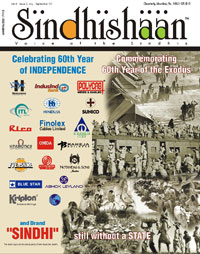POLITICAL RIGHTS FOR SINDHIS
By Ram Jawhrani

The partition of the country in 1947 dealt a heavy blow upon the Sindhi community which migrated to India and settled down at various places in search of livelihood. Not only were the Sindhis uprooted but also they had to start their life afresh from scratch.
Those days, when the constitution was being drafted by the founding fathers of the nation, Sindhis were struggling for their survival. They were scattered all over and could not come together. The immediate need for them was survival. While other communities were able to put forth their point of view to the framers of the constitution, Sindhis could not, and therefore were ignored by those who drafted the constitution.
Though the constitution has been amended 85 times in the last 60 years, the demands of Sindhi community have fallen on deaf ears. Now that the constitution is being reviewed, it is high time that Sindhis raise their voice towards their legitimate demands and bring forward their views. Needless to say that the contribution of the Sindhis to nation building and freedom struggle has been tremendous.
The constitution guarantees equality of status and opportunities for all communities. Unfortunately Sindhis have been ignored. It is a well known fact that they are not represented in the Lok Sabha, Rajya Sabha or any of the State Assemblies.
Articles 330 and 332 of the constitution provide for reservation for scheduled castes and scheduled tribes population in the parliament and state assemblies. These should be amended to include Sindhi Community also in the ratio of their population because Sindhis are politically backward. As they are scattered all over the country they cannot get elected to the Parliament or the State Assemblies on their own strength and hence their voice is not heard at all. It would be fair if three percent of seats in Lok Sabha and State assemblies are reserved for Sindhis. Small states like Mizoram, Nagaland, Sikkim, Meghalaya with populations of about 5 to 7 lakhs have 40 assembly seats. Lakhswadeep with only 30,000 voters has one representative in the Lok Sabha but Sindhis with a population of about one crore, hardly have any representative in the Parliament. In India, Sindhis have become political orphans. Being stateless they stand no chance of getting representation under the present setup. Therefore separate constituencies should be reserved for Sindhis on the basis of their population.
All other communities have got their linguistic states such as Maharashtra, Gujarat, Rajasthan, Punjab, Bengal, Karnataka, Tamil Nadu, etc, but the Sindhis have remained stateless citizens. Even small districts like Mizoram, Nagaland, Sikkim, Meghalaya, Dargeeling (Gorkhaland) are accepted as States.
It would be in the fitness of things if Sindhis are given a State Regional Council with full term of Cabinet Ministers and Chief Minister in Kutch, Dadra Nagar Haveli or any other place in India, so that the community can enjoy the benefit of a State Government.
The Sindhi community should get the status of landless Sindhi state with Headquqrters at Gandhidham (Kutch) Dadra Nagar Haveli, Mumbai or Delhi and they should be allowed to govern themselves with a body of about 60 legislative assembly members elected from all over the country.
Besides the union government should constitute a Sindhi Vikas Board by giving a substantial grant every year for its development.
Article 30 of the constitution provides that all minorities based on religion or language shall have the right to establish and administer educational institutions of their choice. The need of the hour is to establish Sindhi University for the growth of the language. Sindhi schools all over are being closed down because of poor patronage and in the next 50 years the language may not survive. Therefore drastic steps should be taken now to protect Sindhi language and the best course would be to set up a separate Sindhi University.
Every state in India has a regional language which is promoted by the government. Since Sindhis are stateless citizens, their language has not been promoted. It is therefore the responsibility of the government to promote Sindhi language in schools and university.
On the same lines Sindhi should also be introduced as a compulsory subject for all the Sindhi Students in every high school and college throughout India.
The government should declare Sindhis as a special Linguistic Minority Community and help them to device ways and means to protect their language, script and culture. Representation should be given to Sindhis in Minority Commission and the National Council. As a policy decision the Government must ensure that at least two Sindhi Ministers are represented at the centre and State Cabinets in Maharashtra, UP, MP, Rajasthan, Gujarat were Sindhis live in large numbers.
Besides at least two Sindhis should be appointed as Governors and an equal number as ambassadors of India in foreign countries.
Even after 60 years of independence, Sindhis continue to stay in barracks and have not been permanently rehabilitated. In many states their cabins and shops are being demolished, such barracks and cabins should be permanently allotted to Sindhis and regularized to avoid any such problem in future.
Moreover, Sindhis who stayed back in Pakistan and wish to migrate now, should immediately be given citizenship rights without any delay or hardships.
TV stations should also be setup in places where Sindhis have settled in large numbers such as Gandhidham and Kutch for development of language and culture.
Some of the long pending demands of Sindhi community are currency notes bearing value in Sindhi along with the languages in the VIIIth Schedule, Sindhi Jhanki on Republic day, declaration of ‘CHETI CHAND’ as a public holiday, recognition and honors to Sindhi in Government awards such as Padma Bhooshan and Padmashree, allotment of plots in New Delhi and other State capitals for setting up Sindhi Bhavan


